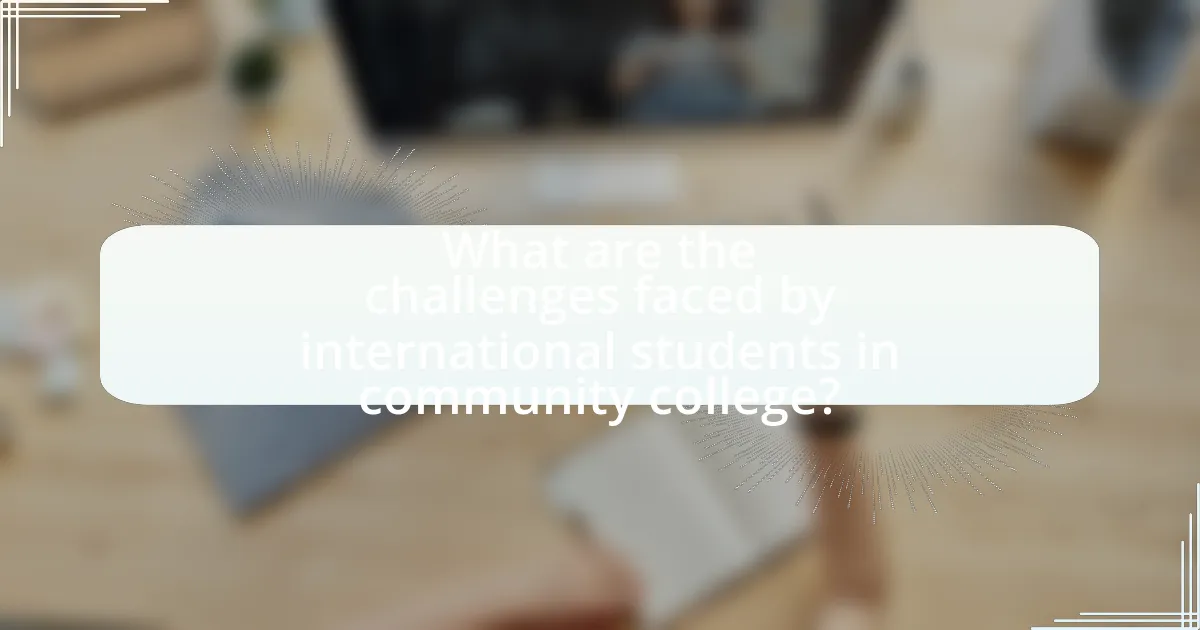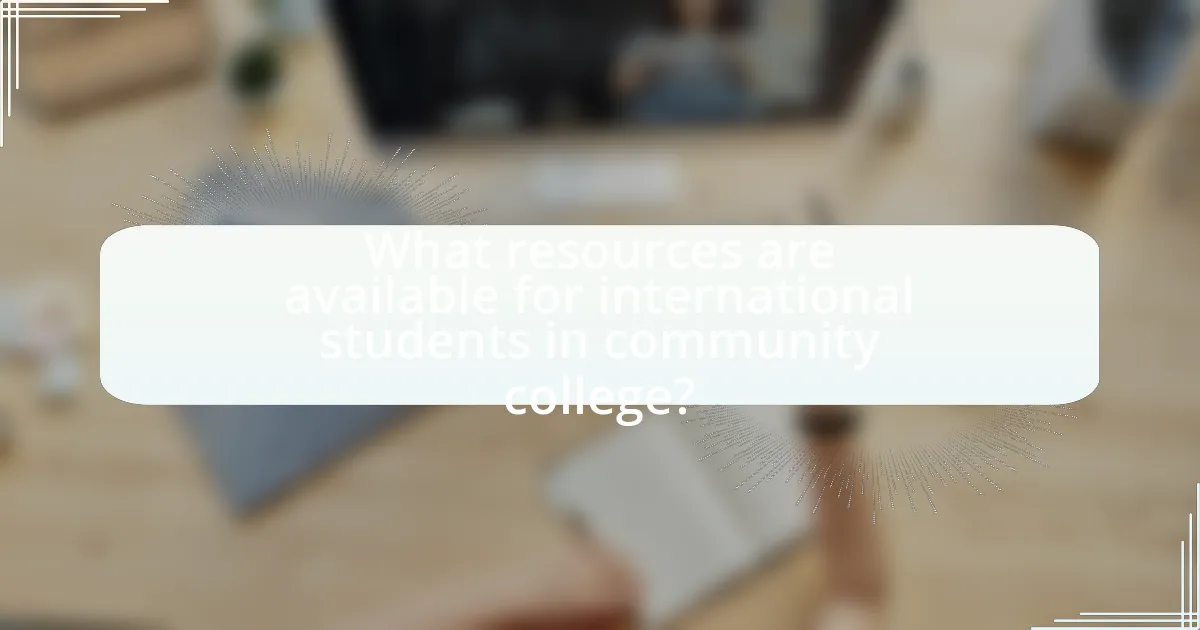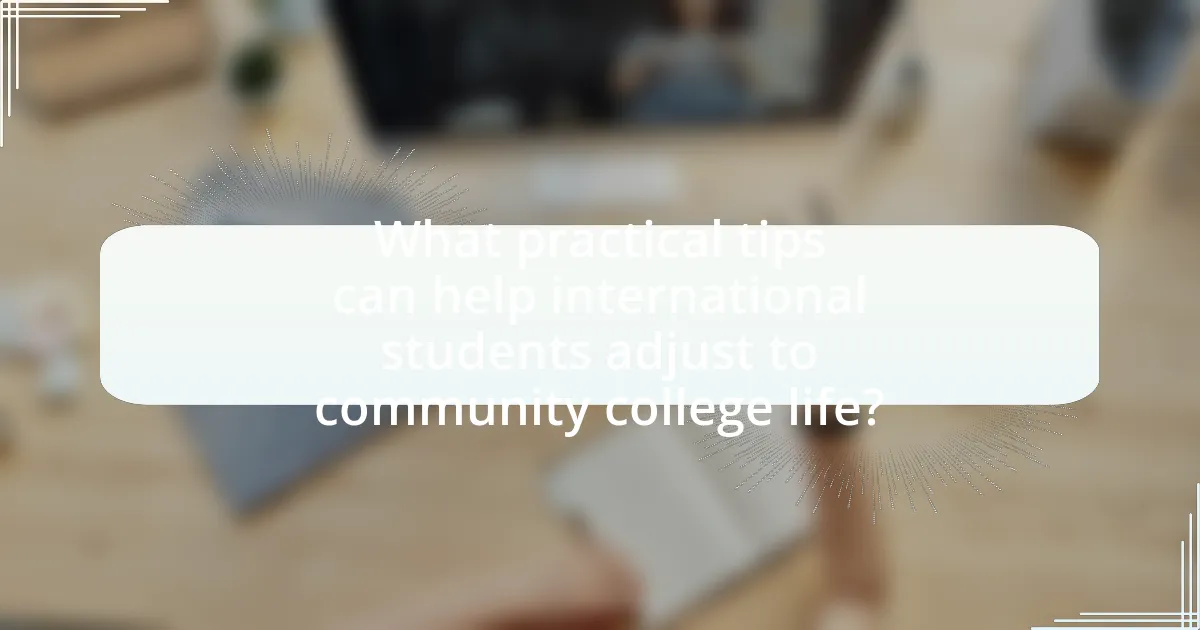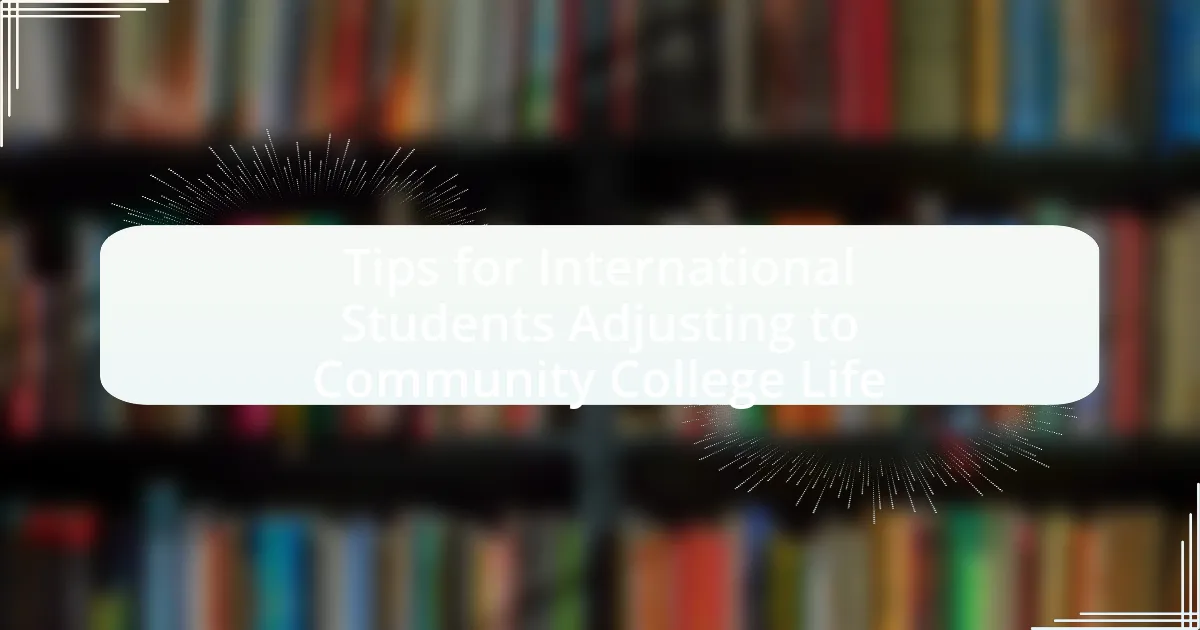The article focuses on the challenges faced by international students adjusting to community college life, highlighting key issues such as language barriers, cultural differences, and financial constraints. It discusses the impact of cultural adjustment on social integration and academic performance, emphasizing the importance of effective communication and engagement in local cultures. Additionally, the article outlines available resources, including academic support services, extracurricular activities, and financial aid options, aimed at facilitating a smoother transition for international students. Strategies for overcoming feelings of isolation and enhancing communication skills are also addressed, providing practical tips for navigating the community college experience.

What are the challenges faced by international students in community college?
International students in community college face several challenges, including language barriers, cultural adjustment, and financial constraints. Language barriers can hinder academic performance and social integration, as many international students may struggle with English proficiency, impacting their ability to participate in class discussions and complete assignments effectively. Cultural adjustment presents another significant challenge, as students must navigate different social norms and educational expectations, which can lead to feelings of isolation or homesickness. Financial constraints often arise due to limited access to scholarships and work opportunities, making it difficult for international students to manage tuition and living expenses. According to a report by the Institute of International Education, financial concerns are a primary reason for the high dropout rates among international students in the U.S. These challenges collectively impact the overall experience and success of international students in community colleges.
How do cultural differences impact the adjustment process?
Cultural differences significantly impact the adjustment process for international students in community colleges by influencing their social interactions, learning styles, and coping mechanisms. For instance, students from collectivist cultures may struggle with the individualistic approach prevalent in many Western educational systems, leading to feelings of isolation or misunderstanding. Research indicates that cultural dissonance can result in increased stress and anxiety, which hinders academic performance and social integration. A study published in the Journal of International Students by Perkins and Neumayer (2014) found that international students who actively engage with local cultures tend to adapt more successfully, highlighting the importance of cultural awareness in facilitating smoother transitions.
What specific cultural challenges do international students encounter?
International students encounter specific cultural challenges such as language barriers, differing social norms, and feelings of isolation. Language barriers can hinder effective communication and academic performance, as many international students may struggle with fluency and comprehension in a new language. Differing social norms can lead to misunderstandings in interpersonal interactions, as customs and behaviors vary significantly across cultures. Additionally, feelings of isolation often arise due to the lack of familiar social support networks, making it difficult for international students to integrate into their new environment. These challenges are documented in studies, such as the research by Mazzarol and Soutar (2002), which highlights the impact of cultural adjustment on international students’ experiences.
How can students navigate cultural misunderstandings?
Students can navigate cultural misunderstandings by actively engaging in open communication and seeking clarification when unsure. This approach fosters understanding and reduces the likelihood of misinterpretations. For instance, research indicates that effective communication strategies, such as asking questions and paraphrasing, can significantly enhance cross-cultural interactions (Gudykunst, 2004). Additionally, participating in cultural exchange activities and workshops can provide students with insights into different cultural norms and practices, further aiding in their adjustment to community college life.
What academic challenges do international students face?
International students face several academic challenges, including language barriers, cultural differences, and unfamiliar educational systems. Language barriers can hinder comprehension of course material and effective communication with peers and instructors, impacting academic performance. Cultural differences may lead to misunderstandings in classroom dynamics and expectations, affecting participation and engagement. Additionally, many international students encounter unfamiliar educational systems that differ significantly from their home countries, which can complicate their adaptation to new academic standards and assessment methods. These challenges are supported by research indicating that language proficiency and cultural adjustment are critical factors influencing the academic success of international students.
How does language proficiency affect academic performance?
Language proficiency significantly affects academic performance by influencing comprehension, communication, and engagement in educational settings. Students with higher language proficiency tend to understand course materials better, participate more actively in discussions, and complete assignments with greater accuracy. Research indicates that students who are proficient in the language of instruction achieve higher grades and demonstrate better critical thinking skills. For instance, a study published in the “Journal of Educational Psychology” found that language skills directly correlate with academic success, highlighting that students with strong language abilities scored, on average, 20% higher on standardized tests compared to their less proficient peers. This evidence underscores the critical role of language proficiency in facilitating effective learning and academic achievement.
What resources are available to help with academic challenges?
Academic challenges can be addressed through various resources such as tutoring services, academic advising, writing centers, and online learning platforms. Tutoring services provide personalized assistance in specific subjects, helping students grasp difficult concepts. Academic advising offers guidance on course selection and academic planning, ensuring students stay on track for their educational goals. Writing centers assist with improving writing skills, providing feedback on assignments and helping with research papers. Online learning platforms, like Khan Academy and Coursera, offer supplemental materials and courses that can enhance understanding of various subjects. These resources are widely available in community colleges and are designed to support students in overcoming academic difficulties.
How does social integration affect international students?
Social integration significantly enhances the academic and personal experiences of international students. When international students engage socially with peers, they report improved mental health, increased academic performance, and a greater sense of belonging. Research indicates that social support networks can mitigate feelings of isolation and homesickness, which are common challenges faced by these students. For instance, a study published in the Journal of International Students found that students who actively participated in social activities had higher levels of satisfaction with their college experience and better academic outcomes. This demonstrates that fostering social connections is crucial for the overall well-being and success of international students in community college settings.
What strategies can help build social connections?
Engaging in social activities and joining clubs are effective strategies to build social connections. Participating in community college events, such as orientation programs and cultural festivals, allows international students to meet peers with similar interests. Research indicates that involvement in extracurricular activities significantly enhances social integration and fosters friendships among students, as highlighted in a study by the American Council on Education, which found that students who engage in campus activities report higher levels of satisfaction and connection. Additionally, utilizing social media platforms to connect with classmates can facilitate communication and relationship-building, further enhancing the social experience in a new environment.
How can students overcome feelings of isolation?
Students can overcome feelings of isolation by actively engaging in social activities and building connections with peers. Participating in clubs, study groups, or community events fosters relationships and creates a sense of belonging. Research indicates that social integration significantly enhances emotional well-being; for instance, a study published in the Journal of College Student Development found that students who engage in campus activities report lower levels of loneliness and higher satisfaction with their college experience. By seeking out these opportunities, students can effectively combat isolation and enhance their overall college life.

What resources are available for international students in community college?
International students in community college have access to various resources designed to support their academic and social integration. These resources typically include international student offices, which provide guidance on visa regulations, cultural adjustment, and academic advising. Additionally, many community colleges offer orientation programs specifically for international students, helping them acclimate to the new environment and connect with peers. Language support services, such as ESL (English as a Second Language) classes, are also commonly available to enhance language proficiency. Furthermore, counseling services can assist with personal and emotional challenges, while student organizations and clubs foster community engagement and cultural exchange. These resources collectively aim to facilitate a smoother transition and enhance the overall experience for international students in community colleges.
How can students access academic support services?
Students can access academic support services through their community college’s dedicated support centers, which typically include tutoring, writing assistance, and study skills workshops. These services are often available both in-person and online, allowing students to choose the method that best fits their needs. Many colleges also provide access to academic advisors who can guide students in utilizing these resources effectively. Additionally, students can find information about academic support services on the college’s official website or by visiting the student services office on campus.
What types of tutoring and mentoring programs are offered?
Various types of tutoring and mentoring programs are offered to support international students in community colleges. These programs typically include one-on-one tutoring sessions, group study workshops, peer mentoring, and academic coaching. One-on-one tutoring provides personalized assistance in specific subjects, while group study workshops facilitate collaborative learning among students. Peer mentoring connects new international students with experienced students who can share insights and guidance, and academic coaching focuses on developing study skills and strategies for success. These programs are designed to enhance academic performance and ease the transition into the community college environment.
How can students utilize library resources effectively?
Students can utilize library resources effectively by actively engaging with available materials and services. This includes accessing academic databases for research, utilizing study spaces for focused work, and attending workshops on information literacy. Research shows that students who frequently use library resources achieve higher academic performance, as libraries provide access to a wealth of information and support services tailored to enhance learning. For instance, a study by the Association of College and Research Libraries found that students who engage with library resources are more likely to develop critical thinking skills and improve their research capabilities.
What extracurricular activities can enhance the college experience?
Extracurricular activities such as student organizations, sports teams, volunteer work, and cultural clubs can significantly enhance the college experience. Engaging in student organizations fosters leadership skills and networking opportunities, while participation in sports teams promotes physical health and teamwork. Volunteer work allows students to give back to the community, enhancing personal growth and social responsibility. Cultural clubs provide a platform for international students to connect with peers, celebrate diversity, and share their heritage, which is crucial for social integration and support during the adjustment to college life.
How do clubs and organizations support international students?
Clubs and organizations support international students by providing a sense of community and facilitating cultural exchange. These groups often organize events, workshops, and social gatherings that help international students connect with peers, share experiences, and adapt to their new environment. For instance, many colleges have international student associations that offer mentorship programs, cultural celebrations, and networking opportunities, which are essential for easing the transition into community college life. Research indicates that participation in such organizations can significantly enhance the social integration and academic success of international students, as they foster relationships and provide resources tailored to their unique challenges.
What role do cultural events play in community engagement?
Cultural events play a crucial role in community engagement by fostering social connections and promoting inclusivity among diverse groups. These events provide opportunities for individuals to share their cultural heritage, which enhances mutual understanding and respect within the community. Research indicates that participation in cultural activities can lead to increased civic involvement, as individuals who engage in such events are more likely to volunteer and participate in local governance. For instance, a study by the National Endowment for the Arts found that communities with vibrant cultural programming experience higher levels of social cohesion and community pride.
What financial resources are available to international students?
International students have access to various financial resources, including scholarships, grants, student loans, and part-time employment opportunities. Scholarships specifically for international students can be offered by colleges, private organizations, and government programs, often based on merit or need. Grants may also be available through educational institutions or non-profit organizations, providing funds that do not require repayment. Additionally, some international students may qualify for federal or private student loans, although eligibility can vary significantly. Part-time employment, such as on-campus jobs or internships, allows students to earn income while studying, often limited to a certain number of hours per week. These resources collectively support international students in managing their educational expenses effectively.
How can students find scholarships specifically for international students?
Students can find scholarships specifically for international students by utilizing online scholarship databases, university financial aid offices, and international student organizations. Online platforms such as Fastweb, Cappex, and ScholarshipPortal aggregate scholarship opportunities tailored for international students, allowing them to filter options based on their specific needs and eligibility criteria. Additionally, many universities have dedicated financial aid offices that provide resources and guidance on available scholarships for international students, often listing them on their official websites. Furthermore, international student organizations and associations frequently offer scholarships or can direct students to relevant funding opportunities.
What budgeting tips can help manage living expenses?
To manage living expenses effectively, international students should create a detailed budget that tracks income and expenses. This budget should categorize spending into fixed costs, such as rent and utilities, and variable costs, like groceries and entertainment. Research indicates that students who maintain a budget are 30% more likely to stay within their financial limits compared to those who do not. Additionally, utilizing student discounts and exploring affordable housing options can further reduce costs, making it easier to manage living expenses while studying.

What practical tips can help international students adjust to community college life?
International students can adjust to community college life by actively participating in campus activities and seeking support services. Engaging in clubs, organizations, and events fosters social connections and helps students build a network, which is crucial for emotional support and integration. Additionally, utilizing resources such as academic advising, counseling services, and international student offices provides essential guidance and assistance tailored to their unique challenges. Research indicates that students who engage with campus resources and communities report higher satisfaction and success rates in their academic pursuits.
How can students effectively manage their time and responsibilities?
Students can effectively manage their time and responsibilities by prioritizing tasks, creating a structured schedule, and utilizing time management tools. Prioritizing tasks involves identifying urgent and important assignments, which helps students focus on what needs immediate attention. Creating a structured schedule, such as a weekly planner, allows students to allocate specific time blocks for studying, attending classes, and completing assignments. Utilizing time management tools, like digital calendars or task management apps, can enhance organization and remind students of deadlines. Research indicates that students who use structured time management strategies report higher academic performance and lower stress levels, demonstrating the effectiveness of these methods in managing responsibilities.
What time management techniques are most effective for students?
Effective time management techniques for students include prioritization, the Pomodoro Technique, and the use of planners or digital tools. Prioritization helps students identify tasks based on urgency and importance, allowing them to focus on what matters most. The Pomodoro Technique, which involves working in focused intervals of 25 minutes followed by short breaks, enhances concentration and productivity. Additionally, utilizing planners or digital tools like Google Calendar can help students organize their schedules, set deadlines, and track assignments, leading to better time allocation. Research indicates that students who implement these techniques often experience improved academic performance and reduced stress levels.
How can students balance academics and social life?
Students can balance academics and social life by prioritizing time management and setting clear boundaries. Effective time management allows students to allocate specific hours for studying, attending classes, and engaging in social activities, ensuring that neither aspect is neglected. Research indicates that students who utilize planners or digital calendars report higher academic performance and better social engagement. For instance, a study published in the Journal of Educational Psychology found that students who practiced structured scheduling improved their grades while maintaining a healthy social life. By establishing a routine that includes both study time and social interactions, students can achieve a harmonious balance between their academic responsibilities and personal relationships.
What strategies can enhance communication skills?
To enhance communication skills, actively practicing listening, speaking, reading, and writing is essential. Engaging in conversations with native speakers improves fluency and comprehension, while participating in group discussions fosters collaborative communication. Additionally, utilizing language learning apps and attending workshops can provide structured practice and feedback. Research indicates that immersive experiences, such as joining clubs or community events, significantly boost language proficiency and confidence in communication.
How can students practice English in everyday situations?
Students can practice English in everyday situations by engaging in conversations with peers, participating in community events, and using English in daily tasks. For instance, students can join study groups or clubs where English is the primary language, allowing them to enhance their speaking and listening skills. Additionally, attending local events or volunteering provides opportunities to interact with native speakers, further improving their language proficiency. Research indicates that immersive experiences, such as conversing with others in real-life contexts, significantly boost language acquisition and retention.
What role does participation in class discussions play in language improvement?
Participation in class discussions significantly enhances language improvement by providing opportunities for active engagement and practice. Engaging in discussions allows students to apply vocabulary and grammar in real-time, facilitating better retention and understanding. Research indicates that interactive learning environments, such as class discussions, lead to increased language proficiency, as students receive immediate feedback from peers and instructors, which helps correct errors and reinforce learning. Furthermore, studies show that verbal communication in a supportive setting boosts confidence, encouraging students to express themselves more freely and effectively in the target language.
What are the best practices for seeking help and support?
The best practices for seeking help and support include identifying specific needs, utilizing available resources, and communicating effectively. International students should first assess their challenges, such as academic difficulties or cultural adjustments, to determine the type of support required. They can then access resources like counseling services, academic advisors, and peer support groups, which are often provided by community colleges. Effective communication is crucial; students should articulate their concerns clearly and ask questions to ensure they understand the support being offered. Research indicates that students who actively seek help are more likely to succeed academically and socially, as highlighted in studies by the American Council on Education, which emphasize the importance of utilizing institutional resources for student success.
How can students approach professors for assistance?
Students can approach professors for assistance by scheduling office hours or sending a well-crafted email. Office hours provide a dedicated time for students to discuss academic concerns directly with professors, fostering a personal connection. Sending an email should include a clear subject line, a polite greeting, a concise explanation of the issue, and a request for assistance. Research indicates that students who actively engage with faculty are more likely to succeed academically, as highlighted in the study “The Impact of Faculty Engagement on Student Success” published in the Journal of Higher Education.
What support networks should students consider joining?
Students should consider joining academic support groups, cultural organizations, and peer mentoring programs. Academic support groups provide tutoring and study resources, which can enhance understanding of course material. Cultural organizations offer a sense of community and help students connect with others from similar backgrounds, fostering social integration. Peer mentoring programs pair students with experienced peers, offering guidance and support during the transition to college life. These networks are essential for academic success and emotional well-being, as they facilitate connections and provide resources tailored to the unique challenges faced by international students.

Leave a Reply